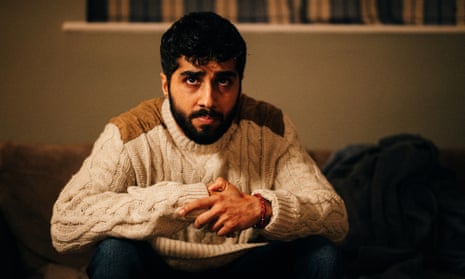For all of the breathless acclaim directed at Chicago-set kitchen drama The Bear, it was Philip Barantini’s Dalston-set equivalent Boiling Point from a year before that truly captured the heat and horror of working in a restaurant. Filmed in one continuous take, it was both technical triumph and masterclass in high-wire suspense, fumbling perhaps in its final overblown moments, but involving enough that by the end, you felt as exhausted as a pot washer ending a busy shift.
Before Barantini’s much-anticipated sequel series comes to the BBC later this year, he’s crafted a thriller of much higher stakes, an almost unbearably tense film about the terror of being subjected to a social media witch-hunt. Accused is a smartphone spin on the age-old wrongly accused subgenre and takes place over just one day as a Londoner’s mundane life descends into chaos that’s mostly awfully easy to believe.
Harri (Sex Education’s Chaneil Kular) is leaving the city to dog-sit for his parents as they go on holiday, edging out of London moments after a deadly bombing on the tube. We see how Twitter flips from shock to speculation as a CCTV image of the suspect goes viral, Harri’s girlfriend joking that it looks like it could be his doppelganger. In a neatly constructed sequence, Harri watches TV with his laptop open, not looking at the screen as a cascade of tweets start to zero in, an old schoolfriend of Harri’s suggesting that he could be behind it.
It remains understandably difficult for most film-makers to capture the immersive highs and lows of digital communication, both technically and dramatically, too often yanking us out when we should be pulled directly in. Barantini, working with his Boiling Point co-writer James Cummings and first-timer Barnaby Boulton, finds a way to visually and emotionally link the two worlds, Harri’s horror at watching it all unfold mirrored by ours, the descent proving agonising for us all to endure. Every careless insinuation, every piece of recklessly shared information, every ensuing insult, all terrifyingly escalated, danger soon leaving the laptop screen and entering Harri’s physical reality. As a British man of south Asian descent, his race is a depressingly inevitable deciding factor in the accusation and then in how he’s portrayed, Barantini not shying away from the vile racism that’s easily espoused by people who would otherwise consider themselves to be moderate, well-meaning citizens offline.
It’s a film of our horrible moment, not only in its digital wrapping, but in its grim snapshot of the ever-increasing, easily disseminated hatred and fear that have further warped how people see and treat each other. While never quite scaling these lofty heights, it often recalls Thomas Vinterberg’s horrifying 2012 drama The Hunt, where Mads Mikkelsen’s simple small town life implodes after a false accusation paints him as a paedophile. Both films capture the clammy unease of being stuck in somewhere you’re worried you may never get out, like being dragged down by quicksand, the all-consuming terror of being seen as something you’re not.
Kular makes for a devastatingly empathetic everyman, his rising panic deeply uncomfortable to watch, a thoughtful balance of fear, upset and disappointment, scared for his wellbeing while reminded of the bigotry that surrounds him. It’s a tough sit for the first half but our anxiety is strangely alleviated when hateful tweets transform into hateful violence, the film faltering when it turns into a more conventional home invasion thriller. It’s not ineffective exactly (the violence is potently nasty) but there’s just something a little flattening as scenes of a more familiar panic seep in, the film becoming more like so many others before it, tension de-escalating by the minute. It’s relatively short, just shy of 90 minutes, but it perhaps would have benefited from being turned into a tighter, hour-long TV drama, playing almost like a grounded episode of Black Mirror. Before it reaches and surpasses the boiling point though, Accused packs one hell of a punch.
after newsletter promotion
Accused is out on 22 September on Tubi in the US and on Netflix in the UK
